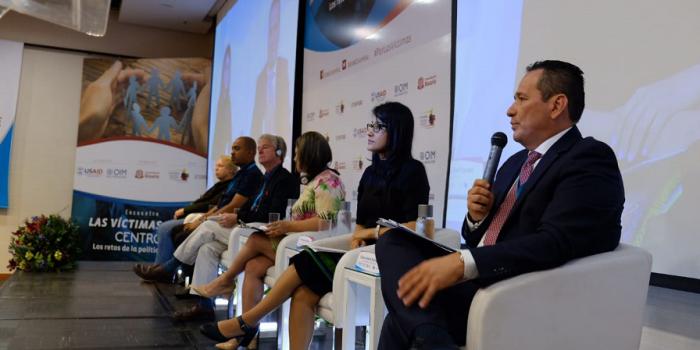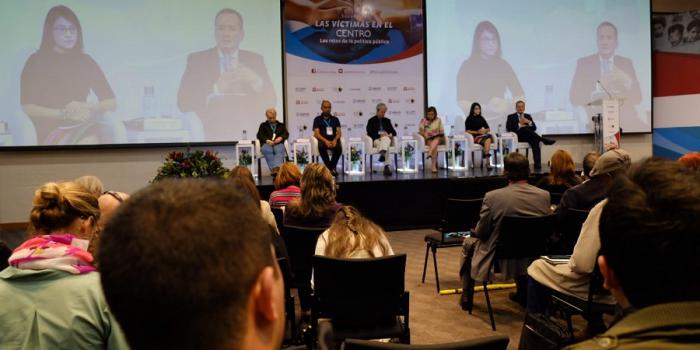
"It is necessary to extend the Law of Victims with responsibility": Director of Unit
Ramón Rodríguez Andrade, director (e) of Victims Unit, said in the framework of the panel 'Victims in the Center, the challenges of public policy', organized by IOM, USAID, El Rosario University and El Espectador, that we must find a balance between the extension time and the existing resources.


In the framework of the panel 'Victims in the Center, the challenges of public policy', organized by IOM, USAID, Universidad del Rosario and El Espectador, the director (e) of the Unit for Victims, Ramón Rodríguez, raised that in order to extend the Victims Law beyond 2021, the limit year of its validity, it is necessary to carry out various actions aimed at assisting the victims of armed conflict in a responsible and efficient manner.
The extension to Law 1448 of 2011, or Law of Victims, is a commitment of the government of the President of the Republic Iván Duque, according to the director (e) of the Victims Unit, Ramón Rodríguez Andrade. "In order to extend Law 1448, the institutional articulation in the issue of victim assistance must be reviewed, the resources must be restrained, adjustments made in contractual matters that allow these resources to pay compensation and purge the Single Registry of Victims, "said Rodriguez.
The official explained that the Unit for Victims is performing a purge of the Victims Registry (RUV) because it has detected that possibly 200,000 people received benefits from the State without being victims.
"There are 200,000 records of victims who possibly incurred a fraud, what we are doing is verifying this situation to process it before the competent authorities, and exclude them from the registry, as we have already done. The purge will allow the real victims affected by armed conflict to have an effective reparation, we will know how many they are and how we are going to comply with them, "he said. If these people become guilty, they would be prosecuted for falsehood in a public document. In this regard, it is unknown how many have received compensation.
Laurence Sacks, director of United States Agency for Development (USAID) in Colombia, said that "it has been crucial to be able to hear the voices of the victims of armed conflict to achieve a transformative and dignifying reparation."
In the panel, Odorico Guerra, coordinator of the National Table of Effective Participation of Victims, said that "many victims need to heal internally, can not qualify moral and psychological damage, so we need the articulation of institutions that are part of the SNARIV (National System of Attention and Reparation to the Victims) ".
In response to this request, the Unit Director indicated that "the Victims' Unit will implement a comprehensive accompaniment strategy that will allow for the development of satisfaction actions, guarantees of non-repetition and psychosocial accompaniment for the victims that are annually focused on compensation. The Ministry of Health will address the demand for physical, mental and psychosocial rehabilitation of the victims through individual and group strategies, for which it will seek to increase the co-financing of these strategies with resources from the territorial entities. "
Ramón Rodríguez also acknowledged that "what makes peace sustainable is the effective presence of the State in the territory, recognizing its particularities, and the generation of public goods and social services for the social and productive inclusion of the victim population."
Among the panelists of the event was Ana Durán, head of mission of the International Organization for Migration (IOM), who said that it is vital to support the processes aimed at restoring confidence in the institutional framework. "We recognize the efforts of Government with regional workshops that take place in the national territory," he said.
Other panelists, moderated by Gloria Castrillón, editorial director of Colombia 2020, of El Espectador, concluded that the implementation of Law 1448 should be improved through the articulation of the National System of Attention to Victims, maintaining the successes and lessons learned in the process and working jointly with the Ministry of Health in psychosocial care processes.
In terms of historical and collective memory processes, Bill Rolston, professor emeritus of sociology at the Institute of Transitional Justice, University of Ulster, Belfast, Northern Ireland, shared his experience with the treatment of conflict in Ireland and the importance of the symbolic expressions of memory that allow the victims to narrate the past through the elaboration of murals. "Memory needs to be public and it is necessary that someone listen respectfully, and at the end of the day that 'someone' should be the whole society."
Sorrer Aroca, governor of Putumayo, said that "the collection of stories is necessary for the memory of the country, the victims should be the center of public policy, we should claim life".
About the resources allocated to the compensation of victims the director (e) of Unit said that so far "837,364 people have been compensated for an amount amounting to 5.5 trillion pesos; in attention and humanitarian aid, 4.6 trillion pesos have been invested since 2012; More than 4 million victims have received some kind of attention; 786 Collective Repair Subjects (CRS) have been identified; Nearly 9,000 Colombian victims have been recognized abroad and they have begun to provide the measures that are necessary outside our borders".






